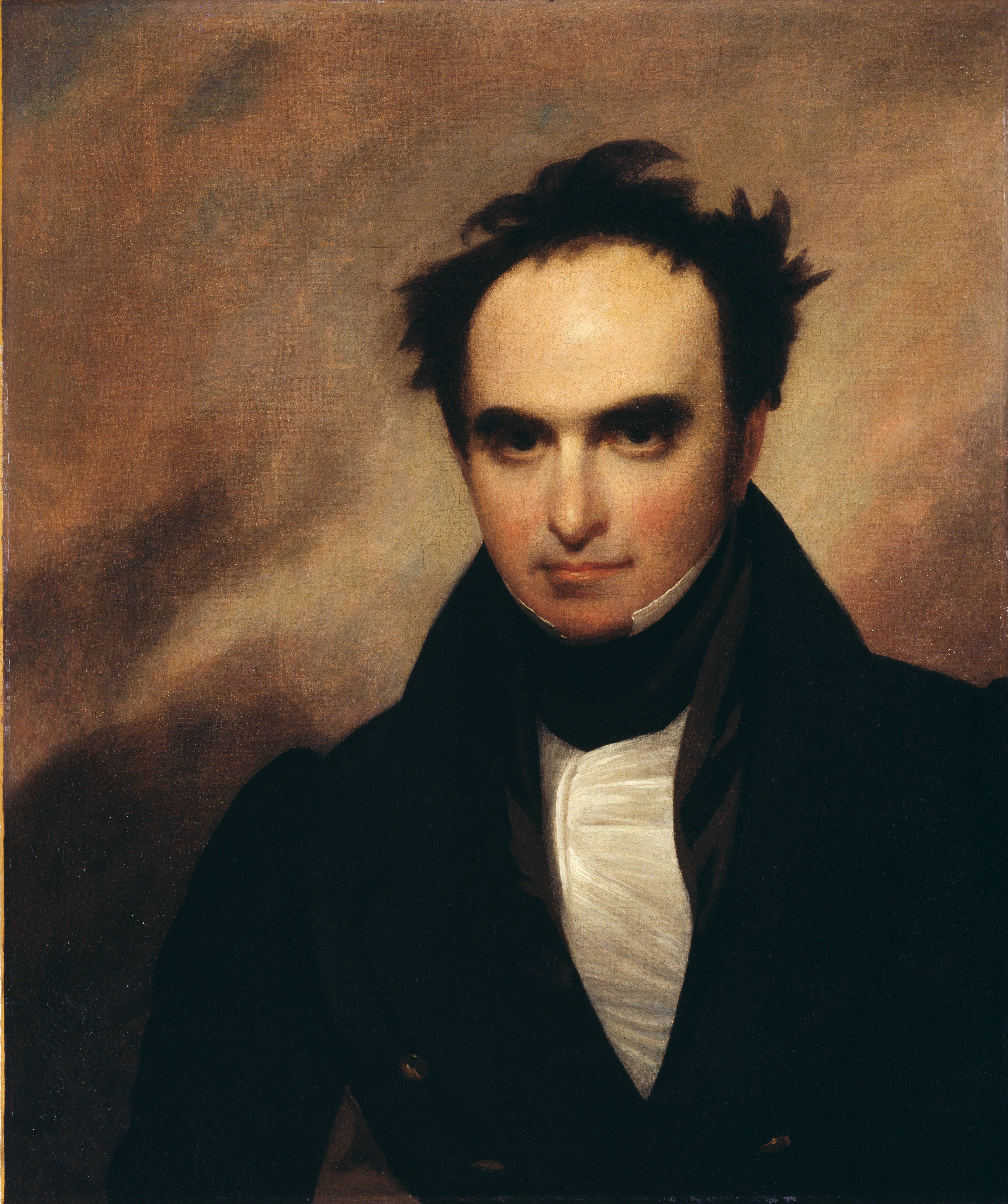Daniel Webster Berühmte Zitate
In Zivilcourage von John F. Kennedy, S. 100
Daniel Webster: Zitate auf Englisch
The earliest version of this seems to be from Savings and Loan Annual 1963, p. 56 http://books.google.com/books?id=RckuAQAAIAAJ&q=%22hold+on+my+friends+to+the+constitution%22&dq=%22hold+on+my+friends+to+the+constitution%22&hl=en&ei=yCxETrWOLMn10gHCm5TbDA&sa=X&oi=book_result&ct=result&resnum=2&ved=0CC0Q6AEwATgU published by the United States Savings and Loan League. Variants of it were quoted by President Ronald Reagan, here http://books.google.com/books?id=tfgIGkforucC&q=%22what+has+happened+once+in+6,000+years+may+never+happen+again%22&dq=%22what+has+happened+once+in+6,000+years+may+never+happen+again%22&hl=en&ei=ejxEToOHMsP20gGI8KHACQ&sa=X&oi=book_result&ct=result&resnum=1&ved=0CC0Q6AEwADgK, here http://books.google.com/books?id=BOzui4UB1xEC&q=%22American+Constitution+shall+fall%22&dq=%22American+Constitution+shall+fall%22&hl=en&ei=Fz1ETvSWAeu80AH3jOHwCQ&sa=X&oi=book_result&ct=result&resnum=5&ved=0CD8Q6AEwBA, and here http://books.google.com/books?id=tfgIGkforucC&q=%22miracles+do+not+cluster%22&dq=%22miracles+do+not+cluster%22&hl=en&ei=3D9ETs7ZNMXj0QHxkcn8CQ&sa=X&oi=book_result&ct=result&resnum=7&ved=0CEYQ6AEwBjgo, for example. A similar quote can be found in a speech by Edwin Meese, a longtime associate of Reagan, part of a 1986 book (pamphlet?), The Great debate: interpreting our written Constitution, page 56 http://books.google.com/books?id=HmVDAQAAIAAJ&q=%22miracles+do+not+cluster%22&dq=%22miracles+do+not+cluster%22&hl=en&ei=3D9ETs7ZNMXj0QHxkcn8CQ&sa=X&oi=book_result&ct=result&resnum=4&ved=0CDcQ6AEwAzgo
Webster did say, in two different places and times, words that are similar enough to be the presumable basis of this misquote, though the phrase "the Republic for which it stands" is best known from its presence in The Pledge of Allegiance http://en.wikipedia.org/wiki/Pledge_of_Allegiance, written in 1892, about 40 years after Webster died. These are Webster's words:
Hold on, my friends, to the Constitution of your country and the government established under it. Leave evils which exist in some parts of the country, but which are beyond your control, to the all-wise direction of an over-ruling Providence. Perform those duties which are present, plain and positive. Respect the laws of your country." (1851 letter from Daniel Webster to Dr. William B. Gooch of West Dennis, Massachusetts, quoted in an 1898 publication of the Bay State Monthly http://books.google.com/books?id=LNwXAQAAIAAJ&pg=PA326&dq=%22hold+on+my+friends+to+the+constitution%22&hl=en&ei=_BxEToOjI-Lb0QGewPnACQ&sa=X&oi=book_result&ct=result&resnum=5&ved=0CEEQ6AEwBA#v=onepage&q=%22hold%20on%20my%20friends%20to%20the%20constitution%22&f=false)
We live under the only government that ever existed, which was formed by the deliberate consultations of the people. Miracles do not cluster. That which has happened but once in six thousand years, cannot be expected to happen often. Such a government, once destroyed, would have a void to be filled, perhaps for centuries, with evolution and tumult, riot and despotism. (From an 1882 book http://books.google.com/books?id=DoCdsVIZzFMC&pg=PA14&dq=%22once+in+six+thousand+years%22+Webster&hl=en&ei=NjhETvblI9K_tgeU-PHDCQ&sa=X&oi=book_result&ct=result&resnum=2&ved=0CC8Q6AEwAQ, which says it is printing an oration given by Webster in 1802; similar but not exactly the same wording can be found in The Granite monthly: a magazine of literature, history and state ...: Volume 5 - Page 7 http://books.google.com/books?id=wRYXAAAAYAAJ&pg=PA7&dq=%22miracles+do+not+cluster%22&hl=en&ei=6xhETtL9NuT30gGvo834CQ&sa=X&oi=book_result&ct=result&resnum=5&ved=0CDwQ6AEwBA#v=onepage&q=%22miracles%20do%20not%20cluster%22&f=false, 1882, which said that it was printing an 1805 address given by Webster in Concord, Massachusetts.) [That Webster would use similar wording in separate orations could be expected, of course.]
The misquote is notable for the emphasis on the Constitution rather the government of the United States; for using the word "fail" (sometimes, "fall"), rather than "destroyed", which opens up a line of argument that Webster was concerned about the Constitution being misinterpreted, in legal cases; and that worldwide anarchy could result from something happening in the United States, something fairly unthinkable in the first half of the 19th century, when the United States was in no way an important country in international matters.
Misattributed
“It is, Sir, as I have said, a small college. And yet there are those who love it!”
Oral argument before the Supreme Court of the United States, March 10, 1818, in Dartmouth College v. Woodward, 17 U.S. 518 (1918)
Quelle: Address on Laying the Cornerstone of the Bunker Hill Monument (1825), p. 64
Speech to the Senate In reference to the Slavery Compromise (7 March 1850)
“Sink or swim, live or die, survive or perish, I give my hand and my heart to this vote.”
See also: "Live or die, sink or swim" (George Peele, Edward I, c. 1584)
Quelle: Discourse in Commemoration of Adams and Jefferson (1826), p. 133
“One country, one constitution, one destiny.”
Speech (15 March 1837); reported in Edward Everett, ed., The Works of Daniel Webster (1851), page 349
Speech (7 May 1834); reported in Edward Everett, ed., The Works of Daniel Webster (1851), page 110
Speech in the Senate (12 March 1838)
“I was born an American; I will live an American; I shall die an American!”
Speech (July 17, 1850); reported in Edward Everett, ed., The Works of Daniel Webster (1851), p. 437
On Mr. Justice Story (September 12, 1845); reported in Edward Everett, ed., The Works of Daniel Webster (1851), page 300
Speech (2 April 1824); reported in Edward Everett, ed., The Works of Daniel Webster (1851), volume iii, page 141
The Dignity and Importance of History http://www.dartmouth.edu/~dwebster/speeches/dignity-history.html (23 February 1852)
Reported in Josiah Hotchkiss Gilbert, Dictionary of Burning Words of Brilliant Writers (1895), p. 33
Quelle: Discourse in Commemoration of Adams and Jefferson (1826), p. 146
Quelle: On the Completion of the Bunker Hill Monument (1843), p. 102
Quelle: On the Completion of the Bunker Hill Monument (1843), p. 93
Quelle: On the Completion of the Bunker Hill Monument (1843), p. 107
Speech at Marshfield, Massachusetts (1 September 1848); reported in Edward Everett, ed., The Works of Daniel Webster (1851), p. 433
Confer Henry Brougham's "What is valuable is not new, and what is new is not valuable." (The Edinburgh Review, The Work of Thomas Young, c. 1802)
“Inconsistencies of opinion, arising from changes of circumstances, are often justifiable.”
Speech (July 25 and 27, 1846); reported in Edward Everett, ed., The Works of Daniel Webster (1851), Vol. V, p. 187
Quelle: Discourse in Commemoration of Adams and Jefferson (1826), p. 136
Quelle: Address on Laying the Cornerstone of the Bunker Hill Monument (1825), p. 74
“The law: It has honored us; may we honor it.”
Speech at the Charleston Bar Dinner (May 10, 1847); reported in Edward Everett, ed., The Works of Daniel Webster (1851), Vol. II, p. 394
On the Old Man of the Mountain
Speech (30 September 1842); reported in Edward Everett, ed., The Works of Daniel Webster (1851), Vol. II, page 117
